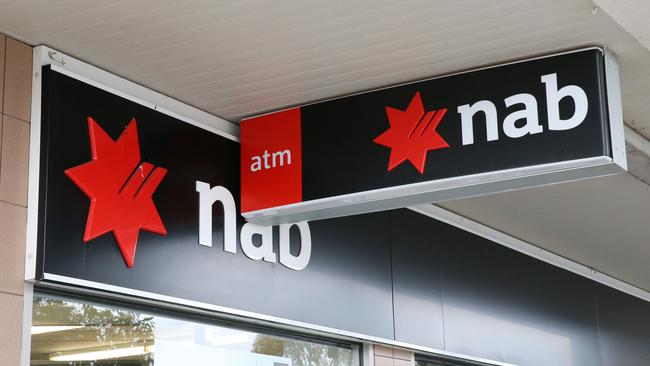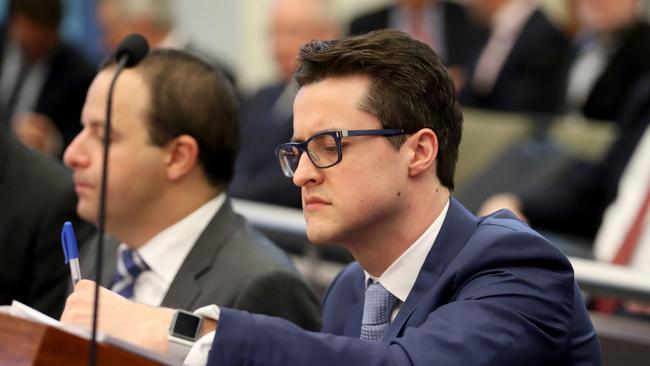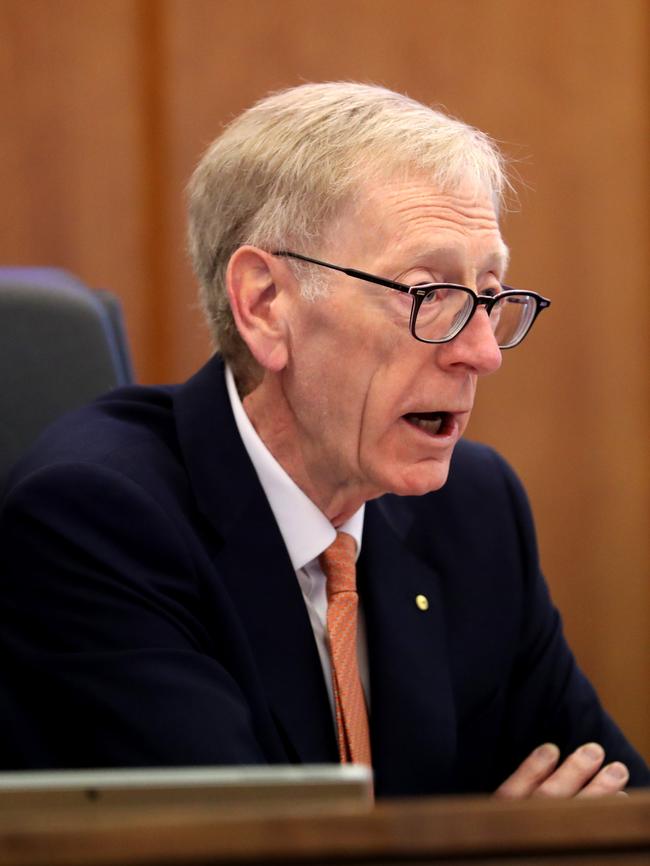Royal commission latest: Super funds in spotlight
AN ex-NAB executive says management “felt an entitlement” to keep charging customers for a financial adviser, even if they didn’t have one, as the finance royal commission scrutinises the $2.6 trillion super fund sector.
Business
Don't miss out on the headlines from Business. Followed categories will be added to My News.
A FORMER National Australia Bank executive said some NAB bosses “felt an entitlement” to continue charging super customers tens of millions of dollars for having a financial adviser — even if they didn’t — because the bank provided a call centre and online tools.
The executive Paul Carter, who ran various NAB wealth operations between 2013 and 2017, said management made a mistake in thinking it could charge the fee.
The royal commission saw internal documents showing 220,000 members had been incorrectly charged $35 million.
MORE BUSINESS NEWS: SUPER FUNDS FACE A POUNDING IN ROYAL COMMISSION
BIG BANKS, MORTGAGE BROKERS SLAMMED IN DAMNING REPORT
The customers were paid back, with each receiving about $160.
“Management mistakenly assumed that the (fee) could be charged to members without a linked adviser for the online tools and telephone based advice services provided,” internal documents from 2016 said.

Mr Carter said the mistake was made in 2013 when members were merged into another fund.
“Management felt an entitlement to charge the fee and we ultimately concluded that was not on the right basis,” the banker said.
Mr Carter also sought to justify charging fees that almost wiped out a year’s gains on a retirement account.
Counsel assisting the commission Michael Hodge pointed out that the woman’s account, which was conservatively invested in cash, got the same high 1.05 per cent fee as a person in an account with risky investments.
“The total fee paid from the account is $929.44. But if you include the tax credit then the total fees paid are $892.90. On an investment in cash which earned $1013.95,” Mr Hodge said.
“No one could believe this was in the member’s best interests to remain in this product incurring these fees while wholly invested in cash. Do you agree?” Mr Hodge asked the witness.
The ex-NAB executive said he disagreed and did not know why the customer made certain investment choices.
“This is a member’s choice. This member made a choice to move 100 per cent of assets into 100 per cent of cash,” Mr Carter said.
Mr Carter now heads the chief customer officer for consumer and wealth at NAB’s New Zealand operation BNZ.
The financial services royal commission also heard that the oversight of Australian’s super savings was often so “hands-off” that funds were “alone in the dark with our money”.
At the same time counsel assisting Michael Hodge said there were a range of “temptations” for trustees running funds to do the wrong thing and asked whether they could be trusted to do the right thing with little over sight.
In some relief for the not for profit “industry” funds, Mr Hodge said the evidence of bad conduct after trawling credit card statements and other documents was “minimal” compared to the bank affiliated “retail” funds.
Aussies hit by super fund fees
THE finance royal commission has been flooded with tales of Australians being whacked by superannuation fees for advice and insurance they didn’t ask for.
In his opening statement for the fifth round of hearings today, counsel assisting Michael Hodge also showed evidence that Australians were often not financially literate enough to understand their super documentation.
As a result, many would struggle to keep track of their retirement savings performance, Mr Hodge said.
There was some confusion between the main regulators, the corporate cop — the Australian Securities and Investments Commission — and the bank regulator, the Australian Prudential Regulation Authority, in co-operating to oversee the system, he said.
Mr Hodge said people making submissions were concerned “about financial advice management fees not being disclosed”.
One person was charged fees for seeing an adviser even though that person had approached a super fund themselves without going through a financial adviser.

Mr Hodge also said insurance charged, but not sought, by consumers would be examined.
The royal commission will also examine why super funds looking after Aussie retirement savings are bankrolling The New Daily news website.
It will scrutinise that operation as it examines the use of consumer’s retirement savings over the next two weeks.
The New Daily is owned by Industry Super Holdings, which is in turn owned by a range of union-affiliated and not-for-profit “industry” super funds.
National Australia Bank superannuation executives were the first to be interrogated today.
During this round of hearings, the commission is examining scandals in the super industry, which holds $2.6 trillion of Aussie retirement funds.
The hearings are taking place at the Federal Court in Melbourne.
Among the first scheduled to appear this round is Nicole Smith, the former chair of NAB’s superannuation trustee Nulis. Ms Smith left the business in June.
Former NAB wealth products head Paul Carter will also be among those who appear in the early stages of this round.
In February last year, the corporate cop revealed Nulis had inadvertently charged 220,000 customers fees totalling $34.7 million for services they never received, and incorrectly refused $1.6 million worth of death and total disability insurance claims.

ASIC pointed the finger at “breakdowns in internal procedures”. NAB’s super products are marketed through its MLC brand.
Problems occurred when changes were made to members’ death and disability insurance during the merger of super accounts into two MLC funds.
NAB has unveiled plans to offload the MLC business, possibly by floating the business on the stockmarket, by the end of the year.
Former Perpetual boss Geoff Lloyd has been hired as the chief of MLC.
Over the next fortnight, the commission will also hear from bank-owned “retail” funds as well as industry funds.
Retail funds to appear will include those owned by AMP, the Commonwealth Bank’s Colonial First State and ANZ’s OnePath businesses.
Industry funds to appear include powerhouse AustralianSuper, Hostplus, Sunsuper, Cbus’s United Super, Catholic Super, Energy Super and QSuper.
General issues expected to be examined in coming weeks include concerns about funds not looking after members’ interests, governance issues and the use of members’ money.


